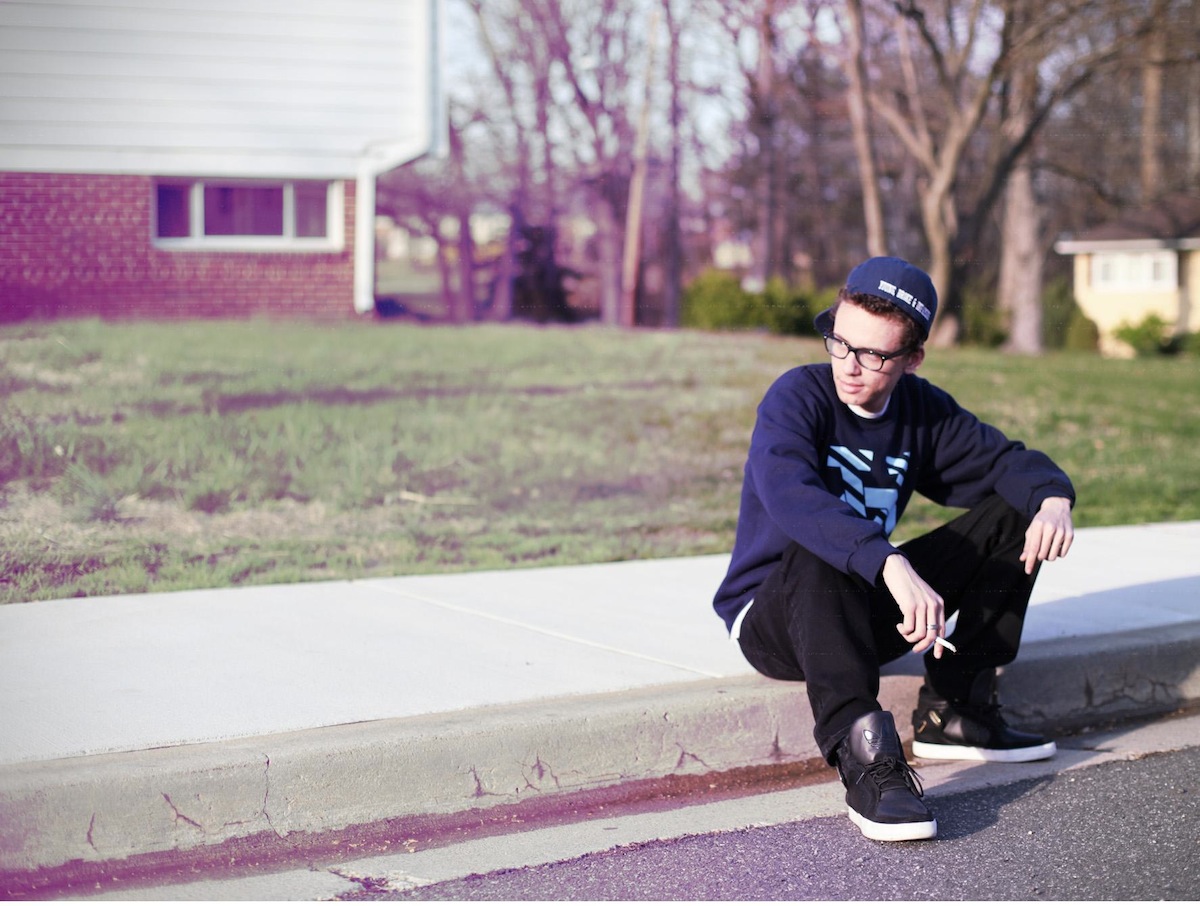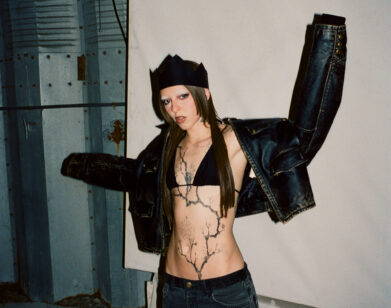Internal Logic

ABOVE: LOGIC. IMAGE COURTESY OF GRVTY
Radio-friendly rap music—a sect of hip-hop that weary purists would consider honeyed fluff—is right in alignment with Logic’s aesthetic. When the 23-year-old Maryland MC emerged on to the scene with Young, Broke, and Infamous in 2010, you’d have assumed he’d be a goldmine for record executives looking to cash in on Drake’s saccharine brand of rap-pop realism: on his mixtape, there are at least five songs with samples used by the Canadian megastar. But with Wu-Tang, Nas, and AZ as influences, he was too underground and too unyielding. The most he was willing to compromise was shortening his stage name, originally Psychological—a sobriquet he found reading the dictionary, for, as he said, “marketing purposes.” But behind the guise of his mind-bending lyrics was a longing for fame of the most glamorous kind.
Young Sinatra was born a year later; and with it came a brigade of followers who called themselves Ratt Packs and Bobby Soxers. This suave moniker was befitting for the burgeoning businessman, who turned the mixtape into a trilogy and with his team, Visionary Music Group, in his corner, made his moves. The young Sir Robert Bryson Hall II had transformed the kid who dropped out of high school and bussed tables at Joe’s Crab Shack, to the polished spitter performing all over the world and inking a partnership with Island Def Jam earlier this year.
But even though Logic’s set to conquer the fame monster, there’s something below the surface about his ascension. Perhaps because, despite the accolades, there’s a barrier to break; he contributes this to his shell, rather than his core. Having just woken up, with only a few hours until he’d entertain a packed crowd, the lyrical mind spoke to us over the phone about race, sex in Paris, and a happy ending.
SAFRA DUCREAY: Did you know Frank Sinatra’s Jaguar is up for auction? Are you gonna buy it?
LOGIC: [laughs] How much is it?
DUCREAY: About $45 to 65 thousand.
LOGIC: That’s right within my price range! I have to buy that one… that’s very cool.
DUCREAY: One of the first things you bought for yourself was a pair of Nike Air Jordans, right?
LOGIC: Yeah. I’m very weird with my money. Not to sound cliché, but some of the first things that I bought were for my homies and my team; making sure the people that helped me and ensured my security and safety during my come-up, while I was broke, had the opportunity to be okay. Just little things like that, and moving to L.A., putting down money on things like a house, so we can all live together and be creative. Nobody knows this, but the first actual purchase, after I signed my deal and called my bank account and heard how much money was in there—’cause I was so broke and hungry—was Taco Bell.
DUCREAY: You can’t run away from where you came from. I’m thinking you bought three custom-made Salvatore Ferragamo suits…
LOGIC: Ha! I’m so chilled it’s not even funny, man. I’m just a normal G. I enjoy certain things, but I don’t go out, I don’t party. I just like watching movies, making fun music, and having a good time hanging out with the people who helped me get here—I’m a really simple guy.
DUCREAY: You live in L.A. now?
LOGIC: Yeah, I moved out there just to be closer to [the producer] No I.D. and learn from him and create a great album.
DUCREAY: And to go to the beach sometimes.
LOGIC: No.
DUCREAY: No?
LOGIC: [laughs] I should, right? I’ve been living out there for six months and haven’t gone to the beach once.
DUCREAY: You’re from Gaithersburg, Maryland?
LOGIC: Yeah, that’s such a weird name when you think about it.
DUCREAY: Yeah. I’m just looking through the news here: a rapping teacher arrested for drug charges; a woman sexually assaulted by a masked burglar; a man thankful to be alive after a tree falls on his car; a man charged in alleged homicide with a hatchet—this is in the last few days. Is this a day in the life?
LOGIC: That’s every single day. But it’s funny, because when you look at pictures of Gaithersburg, it’s beautiful—it’s a really great place, but at the same time you drive a couple of minutes down the road and you’re in the slums. Which is funny, because that’s anywhere in the world. Garden City [Long Island] is one of the most beautiful places I’ve ever been to, but then you literally drive a couple minutes and you’re in Hempstead, New York, which is super ghetto—that’s where Method Man grew up. It doesn’t matter where you go or where you live. Sometimes people might say, “You’re from Gaithersburg. What are you talking about when you mention seeing shit from the streets in your music?” It’s so hard to believe that somebody can grow up exposed to narcotics, a single mother and all these things and not be fucked up by it. Honestly, I think it just comes down to the color of my skin and how I represent myself. Wale, who’s a really awesome rapper and very cool dude, and I are from the same exact place, but nobody thinks twice when he talks about how he grew up in the streets. It’s just funny how someone’s perception can change how they perceive the truth. I never glorified that I grew up in a building where crack was made, served, and sold. It’s unbelievable that I can have an intelligent conversation and represent myself in the manner that I do despite the circumstances. Look at Quincy Jones. He grew up in the south side of Chicago in an area that was just gang wars but grew up to be an incredible musician who represents himself in a very good way.
DUCREAY: I sense a lot of exasperation in your lyrics when talking about being mixed. Is this still a taboo in America?
LOGIC: It’s hip-hop. I want you to imagine—and I always use this, because it really is the best way to explain it. Take someone who is Dominican, so they’re obviously Hispanic, but a majority of the time, they look black. I met a fair amount of Dominicans when I was growing up as a kid, and it’d be like, “Oh yeah, so you’re black?,” and they’d say, “Nah, we’re Dominican,” and then they’d speak Spanish. It would be ignorant to assume all Hispanics are Mexican, or Salvadorian, because you don’t know. And they want you to know that they’re proud of where they’re from. In hip-hop, there’s this preconceived notion. I know that I look white. I’ve only talked about it once or twice in my other mixtapes, but on Welcome To Forever I really stress it in four or five songs, and the reason that I do that is because I want people to know I am half black, half white and I am proud to be who I am. The reason I stress that is because for so many years I’ve been called that white rapper.
DUCREAY: This still seems like an American thing as opposed to a hip-hop thing.
LOGIC: It is hip-hop, without a doubt. In hip-hop, white people aren’t accepted.
DUCREAY: Are you sure about that…
LOGIC: They’re not! You have Eminem and that’s it. What other…
DUCREAY: Mac Miller, Macklemore, Iggy Azalea…
LOGIC: Nope. We’re talking white rappers who are 100 percent just respected and not looked at as their race. Eminem broke through it. Mac Miller is an independent artist; Macklemore is an independent artist; he has three number ones, but I’m talking just straight-up hip-hop, people still call him that white rapper. They call Mac Miller a white rapper. And one thing I’ve noticed today more and more, only the ignorant people who have never heard my music are calling me a white rapper. Everybody else is just calling me a rapper. And that’s something that I love, because they are forced to see past just my race. Even though they look at my skin, and they see that I’m white, but they know that I’m black, which they, quote unquote, “know” is more accepting in the grand scheme—I think it’s bullshit. But I love that I’m kind of breaking that barrier and forcing people to go, he’s a dope rapper.
DUCREAY: Based on videos of your shows, your audience is very diverse. Your crowd speaks for itself; you don’t have to answer to anybody.
LOGIC: It’s not that. The reason I have the crowd that I do, especially in hip-hop, is a large per cent of the consumers are Caucasian—that’s real shit, especially in America, it doesn’t matter if you go to a DMX, Wu-Tang or Mac Miller show—a majority of the audience is Caucasian which is crazy however, with my shows I’ve seen mothers and fathers bring their kids. You have to understand, I don’t stress it because I want to be accepted—I want you to know who I am, and where I come from and why I am proud to be who I am. People are gonna call me white, but I’m black and white, and I was raised in a black family. My mother is the only person who looks white, and I am the only person who looks white, and I’m proud to be both black and white; I’m not proud to be one over the other.
DUCREAY: Speaking of diversity, you’ve been to Tokyo, right?
LOGIC: I have not, but I really wanna go.
DUCREAY: I could have sworn you said that in a song…
LOGIC: Ah! That was more of a rapper kind of stunt. Lupe Fiasco has a song “Paris, Tokyo,” so I was talking about how I had sex in Paris—which isn’t true, it’s just me having fun—and I was like, I’m having sex in Paris, I’m getting crème brû-laid, and I have a show in Tokyo so I’m lu-paid.
DUCREAY: That’s clever. Where would you like to die?
LOGIC: I think in my bed, with the woman that I love, in my sleep, hopefully, at an old age; I could die in an old motel, as long as I’m happy. But it probably wouldn’t be too good for the person when they wake up and realize I’m dead. [laughs]
LOGIC PLAYS IRVING PLAZA TOMORROW, JUNE 22. FOR MORE ON THE ARTIST, VISIT HIS WEBSITE OR TWITTER.






